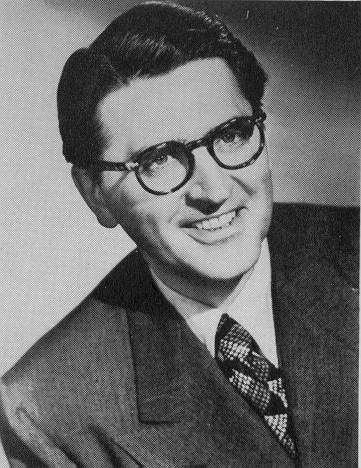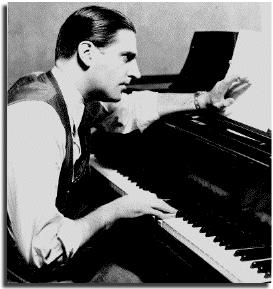Биография "Meredith Wilson"
<< Вернуться к списку всех песен "Meredith Wilson"
Robert Meredith Willson (May 18, 1902 – June 15, 1984) was an American composer, songwriter, conductor and playwright best known for writing the book, music and lyrics for the hit Broadway musical The Music Man, which won the Tony Award for Best Musical in 1958. The cast recording of The Music Man won the first Grammy Award given for best cast album, and its 1962 film adaptation was a success.
Starting in the 1920s as a member of John Philip Sousa’s band and then the New York Philharmonic Orchestra, Willson became a radio music director in the 1930s. He then worked on films and was nominated for two Academy Awards; in 1940 (Best Original Score for «The Great Dictator») and in 1941 (Best Music Score of a Dramatic Picture for «The Little Foxes»). After more radio work during World War II, he worked on the Burns and Allen and Jack Benny radio programs, among others. Willson’s second Broadway musical, The Unsinkable Molly Brown, was a success in 1960. He also composed symphonies and a number of popular songs.
Early life
Born Robert Meredith Willson in Mason City, Iowa, Willson attended Frank Damrosch’s Institute of Musical Art (later The Juilliard School) in New York City. In August 1920 he married his high school sweetheart, Elizabeth «Peggy» Wilson. A flute and piccolo player, Willson was a member of John Philip Sousa’s band (1921–1923) and the New York Philharmonic Orchestra under Arturo Toscanini (1924–1929). Willson then moved to San Francisco, California as the concert director for KFRC, and then as a musical director for the NBC radio network in Hollywood.
His work for films included writing the music for Charlie Chaplin’s The Great Dictator (1940) and William Wyler’s The Little Foxes (1941), both of which garnered him Academy Award nominations. During World War II, he worked for the United States’ Armed Forces Radio Service. His work with the AFRS teamed him with George Burns, Gracie Allen and Bill Goodwin. He would work with all three as the bandleader, and a regular character, on the Burns and Allen radio program. He played a shy man, always trying to get advice on women. His character was dizzy as well, basically a male version of Gracie Allen’s character.
Returning to network radio after WWII, he created the Talking People, a choral group that spoke in unison while delivering radio commercials. He also became the musical director for The Big Show, a prestigious comedy-variety program hosted by actress Tallulah Bankhead and featuring some of the world’s most respected entertainers. Willson himself became part of one of the show’s very few running gags, beginning replies to Bankhead’s comments or questions with, «Well, sir, Miss Bankhead…» Willson wrote the song, «May the Good Lord Bless and Keep You» for the show. Bankhead spoke the lyrics over the music at the end of each show. For a few years in the early 1950s, Willson was a regular panelist on the Goodson-Todman game show The Name’s the Same.
Broadway musicals
Willson’s most famous work, The Music Man, premiered on Broadway in 1957 and was adapted twice for film (in 1962 and 2003). He referred to the show as «an Iowan’s attempt to pay tribute to his home state.» It took Willson some eight years and thirty revisions to complete the musical, for which he wrote more than forty songs. The cast recording of The Music Man won the first Grammy Award for Best Original Cast Album (Broadway or TV) ever issued.
His second musical, The Unsinkable Molly Brown, ran on Broadway for 532 performances from 1960 to 1962 and was made into a 1964 motion picture starring Debbie Reynolds. His third musical to reach Broadway was an adaptation of the film Miracle On 34th Street, called Here’s Love (1963). His fourth, last, and least successful musical was 1491, which told the story of Columbus’s attempts to finance his famous voyage. It was produced by the Los Angeles Civic Light Opera Association but never made it to
Broadway.
Other work
His Symphony No. 1 in F minor, A Symphony of San Francisco, and Symphony No. 2 In E Minor, Missions of California, were recorded in 1999 by William T. Stromberg conducting the Moscow State Symphony Orchestra. Other symphonic works include O.O. McIntyre Suite, Symphonic Variations on an American Theme and Anthem, and the symphonic poem Jervis Bay. Other concert works include Ask Not, which incorporates a portion of John F. Kennedy’s Inaugural Address. Willson’s chamber music includes A Suite for Flute.
Willson penned a number of very well-known songs, such as «Seventy-Six Trombones,» «Gary Indiana,» «It’s Beginning to Look a Lot Like Christmas,» «May the Good Lord Bless and Keep You» and «Till There Was You,» which was a hit for the Beatles in 1963. He also wrote the University of Iowa’s fight song and Iowa State University’s «For I for S Forever». He honored The Salvation Army with a musical tribute entitled «Banners and Bonnets.» He also wrote the fight song for his hometown high school «Mason City Go!» and a tribute to the Idyllwild School of Music and the Arts, ISOMATA (see Idyllwild Summer Program) «In Idyllwild» for orchestra, choir, vocal solo and Alphorn.
Another oddity in Willson’s body of work is «Chicken Fat», written in 1962. In the 1960s, this was the theme song in school gymnasiums across the nation as part of President John F. Kennedy’s youth fitness program. It was time to get the country’s youth into shape, and Willson’s song had youngsters moving through basic exercises at a frenetic pace: push-ups, sit-ups, jumping jacks, torso twists, running in place, pogo springs, and plenty of marching. With an energetic lead vocal by Robert Preston, orchestral marching band, and full chorus, it was likely recorded during sessions for the Music Man motion picture.
In general, it was recognized that Willson wrote surprisingly well-crafted, complex music that classical music fans could appreciate, with intricate and sometimes startling counterpoint, well-crafted melody, and subtle orchestration, all while still appealing to mass audiences. For instance, «76 Trombones» and «Goodnight, My Someone» are essentially the same tune, one in march time and the other in waltz time.
Through his MPL Communications company, former Beatle Sir Paul McCartney controls the rights to Willson’s catalog.
Personal life and legacy
Willson wrote three autobiographies: «And There I Stood With My Piccolo» (1948) «Eggs I Have Laid» (1955) and «But He Doesn’t Know the Territory» (1959).
He was married three times. After divorcing Elizabeth, he married Ralina «Rini» Zarova on March 13, 1948. After she died on December 6, 1966, he married Rosemary Sullivan in February 1968, and she survived him. Willson and his wife lived for years in the Mandeville Canyon section of Brentwood, California. In the 1960s, Willson was fondly remembered by friends and neighbors as a warm and gregarious host who loved nothing more than to play the piano and sing at parties. Willson often gave out autographed copies of his record album, Meredith Willson Sings Songs from The Music Man. In 1982, both he and Rosemary appeared in the audience of The Lawrence Welk Show.
Willson died of heart failure in 1984 at the age of 82. He is buried at the Elmwood Saint Joseph Cemetery in Mason City, Iowa. His alma mater, the Juilliard School, dedicated its first and only residence hall to Willson in 2005. He was a member of the National Honorary Band Fraternity, Kappa Kappa Psi. Willson’s boyhood home is part of The Music Man Square, located in Mason City.
From about 1948 to the end of his life he was an active member, a deacon, of Westwood Hills Congregational Church in Los Angeles. He donated a stained glass window, known as «The Music Man Window», above the pew where he would sit, which represented various musical instruments. He drove a Rolls Royce to church. He composed hymns for the church, including: «Anthem of the Atomic Age» in 1953. He and the pastor, who was also from Northeastern Iowa, were very close friends.
The North Iowa Band Festival in Mason City, Iowa is a yearly event celebrating music with a special emphasis on Marching Bands. Willson returned several times to his home town of Mason City during the 1950’s to partake in the event including leading the «Big Parade». The premier of the motion picture, «The Music Man» was held in Mason City and the Festival reflected the event with special appearances by stars of the show including Shirley Jones and Robert Preston.
On June 23, 1987, Meredith Willson was presented, posthumously, with the Presidential Medal of Freedom by President Ronald Reagan.
Specially from Coffee__Girl
Starting in the 1920s as a member of John Philip Sousa’s band and then the New York Philharmonic Orchestra, Willson became a radio music director in the 1930s. He then worked on films and was nominated for two Academy Awards; in 1940 (Best Original Score for «The Great Dictator») and in 1941 (Best Music Score of a Dramatic Picture for «The Little Foxes»). After more radio work during World War II, he worked on the Burns and Allen and Jack Benny radio programs, among others. Willson’s second Broadway musical, The Unsinkable Molly Brown, was a success in 1960. He also composed symphonies and a number of popular songs.
Early life
Born Robert Meredith Willson in Mason City, Iowa, Willson attended Frank Damrosch’s Institute of Musical Art (later The Juilliard School) in New York City. In August 1920 he married his high school sweetheart, Elizabeth «Peggy» Wilson. A flute and piccolo player, Willson was a member of John Philip Sousa’s band (1921–1923) and the New York Philharmonic Orchestra under Arturo Toscanini (1924–1929). Willson then moved to San Francisco, California as the concert director for KFRC, and then as a musical director for the NBC radio network in Hollywood.
His work for films included writing the music for Charlie Chaplin’s The Great Dictator (1940) and William Wyler’s The Little Foxes (1941), both of which garnered him Academy Award nominations. During World War II, he worked for the United States’ Armed Forces Radio Service. His work with the AFRS teamed him with George Burns, Gracie Allen and Bill Goodwin. He would work with all three as the bandleader, and a regular character, on the Burns and Allen radio program. He played a shy man, always trying to get advice on women. His character was dizzy as well, basically a male version of Gracie Allen’s character.
Returning to network radio after WWII, he created the Talking People, a choral group that spoke in unison while delivering radio commercials. He also became the musical director for The Big Show, a prestigious comedy-variety program hosted by actress Tallulah Bankhead and featuring some of the world’s most respected entertainers. Willson himself became part of one of the show’s very few running gags, beginning replies to Bankhead’s comments or questions with, «Well, sir, Miss Bankhead…» Willson wrote the song, «May the Good Lord Bless and Keep You» for the show. Bankhead spoke the lyrics over the music at the end of each show. For a few years in the early 1950s, Willson was a regular panelist on the Goodson-Todman game show The Name’s the Same.
Broadway musicals
Willson’s most famous work, The Music Man, premiered on Broadway in 1957 and was adapted twice for film (in 1962 and 2003). He referred to the show as «an Iowan’s attempt to pay tribute to his home state.» It took Willson some eight years and thirty revisions to complete the musical, for which he wrote more than forty songs. The cast recording of The Music Man won the first Grammy Award for Best Original Cast Album (Broadway or TV) ever issued.
His second musical, The Unsinkable Molly Brown, ran on Broadway for 532 performances from 1960 to 1962 and was made into a 1964 motion picture starring Debbie Reynolds. His third musical to reach Broadway was an adaptation of the film Miracle On 34th Street, called Here’s Love (1963). His fourth, last, and least successful musical was 1491, which told the story of Columbus’s attempts to finance his famous voyage. It was produced by the Los Angeles Civic Light Opera Association but never made it to
Broadway.
Other work
His Symphony No. 1 in F minor, A Symphony of San Francisco, and Symphony No. 2 In E Minor, Missions of California, were recorded in 1999 by William T. Stromberg conducting the Moscow State Symphony Orchestra. Other symphonic works include O.O. McIntyre Suite, Symphonic Variations on an American Theme and Anthem, and the symphonic poem Jervis Bay. Other concert works include Ask Not, which incorporates a portion of John F. Kennedy’s Inaugural Address. Willson’s chamber music includes A Suite for Flute.
Willson penned a number of very well-known songs, such as «Seventy-Six Trombones,» «Gary Indiana,» «It’s Beginning to Look a Lot Like Christmas,» «May the Good Lord Bless and Keep You» and «Till There Was You,» which was a hit for the Beatles in 1963. He also wrote the University of Iowa’s fight song and Iowa State University’s «For I for S Forever». He honored The Salvation Army with a musical tribute entitled «Banners and Bonnets.» He also wrote the fight song for his hometown high school «Mason City Go!» and a tribute to the Idyllwild School of Music and the Arts, ISOMATA (see Idyllwild Summer Program) «In Idyllwild» for orchestra, choir, vocal solo and Alphorn.
Another oddity in Willson’s body of work is «Chicken Fat», written in 1962. In the 1960s, this was the theme song in school gymnasiums across the nation as part of President John F. Kennedy’s youth fitness program. It was time to get the country’s youth into shape, and Willson’s song had youngsters moving through basic exercises at a frenetic pace: push-ups, sit-ups, jumping jacks, torso twists, running in place, pogo springs, and plenty of marching. With an energetic lead vocal by Robert Preston, orchestral marching band, and full chorus, it was likely recorded during sessions for the Music Man motion picture.
In general, it was recognized that Willson wrote surprisingly well-crafted, complex music that classical music fans could appreciate, with intricate and sometimes startling counterpoint, well-crafted melody, and subtle orchestration, all while still appealing to mass audiences. For instance, «76 Trombones» and «Goodnight, My Someone» are essentially the same tune, one in march time and the other in waltz time.
Through his MPL Communications company, former Beatle Sir Paul McCartney controls the rights to Willson’s catalog.
Personal life and legacy
Willson wrote three autobiographies: «And There I Stood With My Piccolo» (1948) «Eggs I Have Laid» (1955) and «But He Doesn’t Know the Territory» (1959).
He was married three times. After divorcing Elizabeth, he married Ralina «Rini» Zarova on March 13, 1948. After she died on December 6, 1966, he married Rosemary Sullivan in February 1968, and she survived him. Willson and his wife lived for years in the Mandeville Canyon section of Brentwood, California. In the 1960s, Willson was fondly remembered by friends and neighbors as a warm and gregarious host who loved nothing more than to play the piano and sing at parties. Willson often gave out autographed copies of his record album, Meredith Willson Sings Songs from The Music Man. In 1982, both he and Rosemary appeared in the audience of The Lawrence Welk Show.
Willson died of heart failure in 1984 at the age of 82. He is buried at the Elmwood Saint Joseph Cemetery in Mason City, Iowa. His alma mater, the Juilliard School, dedicated its first and only residence hall to Willson in 2005. He was a member of the National Honorary Band Fraternity, Kappa Kappa Psi. Willson’s boyhood home is part of The Music Man Square, located in Mason City.
From about 1948 to the end of his life he was an active member, a deacon, of Westwood Hills Congregational Church in Los Angeles. He donated a stained glass window, known as «The Music Man Window», above the pew where he would sit, which represented various musical instruments. He drove a Rolls Royce to church. He composed hymns for the church, including: «Anthem of the Atomic Age» in 1953. He and the pastor, who was also from Northeastern Iowa, were very close friends.
The North Iowa Band Festival in Mason City, Iowa is a yearly event celebrating music with a special emphasis on Marching Bands. Willson returned several times to his home town of Mason City during the 1950’s to partake in the event including leading the «Big Parade». The premier of the motion picture, «The Music Man» was held in Mason City and the Festival reflected the event with special appearances by stars of the show including Shirley Jones and Robert Preston.
On June 23, 1987, Meredith Willson was presented, posthumously, with the Presidential Medal of Freedom by President Ronald Reagan.
Specially from Coffee__Girl






